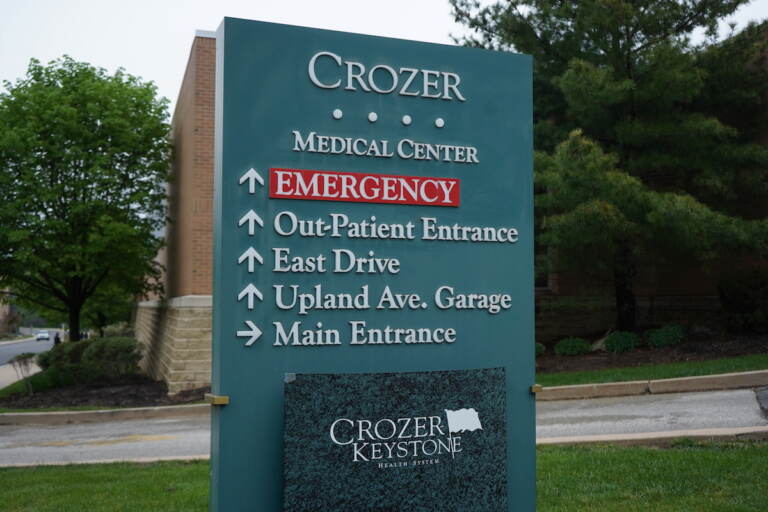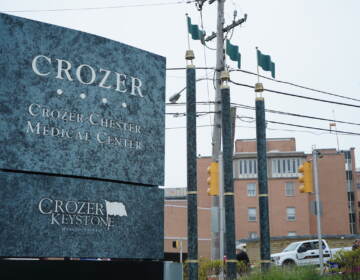Crozer Health’s transition back to nonprofit status could come with a catch
Prospect Medical Holdings, the parent company of the four-hospital system, wants to receive a management fee from Crozer Health after the nonprofit conversion.

Crozer-Chester Medical Center is one of the Crozer Health's four hospitals. (Kenny Cooper/WHYY News)
Got a question about life in Philly’s suburbs? Our suburban reporters want to hear from you! Ask us a question or send an idea for a story you think we should cover.
Crozer Health’s transition back to nonprofit status could cost the Delaware County hospital system more.
In a recent discussion with elected officials, Prospect Medical Holdings, the parent company, has been floating the idea of receiving an undisclosed amount of management fees from Crozer in exchange for managing it once it becomes a nonprofit.
“In a way, they really want to have it both ways — Prospect wants to continue to make a profit off of our healthcare system, while theoretically its subsidiary, Crozer, reaps the benefits of being a nonprofit,” state Rep. Mike Zabel said.
Crozer did not immediately respond to a WHYY News request for comment.
State Sen. Tim Kearney, who was also on the call, said that the possibility of a management fee was a relatively new development. Up until recently, regular legislator calls with Prospect and Crozer did not go into specifics.
He added that management fees aren’t a new invention in the world of nonprofits, but he is concerned about its inclusion in healthcare.
“Unfortunately, they’re very often used by private equity companies, as a sort of a wealth extraction tool … It would be kind of shameful for them to kind of do this to the Crozer system at this point,” Kearney said.
It has been a rough year for Crozer so far. With many units and wards at the hospitals closed, a possible sale kept many community members and employees hopeful for change. However, ChristianaCare announced last week that it was backing out of a deal to buy Crozer from Prospect.
Although many welcomed Crozer’s potential return to nonprofit status under Prospect’s watch, some are concerned that management fees don’t do anything to solve the existing problems and could actually undermine quality healthcare.
“My problem with this, of course, is that if anything, all this really solves is it gives Prospect a steady reliable stream of income from the system. It doesn’t really do anything to address the fact that the system is facing significant financial challenges because of poor, profit-driven decisions that Prospect already made,” Zabel said.
Prospect has a rather beguiling history with management fees. Previously owned by private equity firm Leonard Green & Partners, Prospect forked over management fees to its controlling party, according to Eileen O’Grady, a research manager for the Private Equity Stakeholder Project.
“They had what’s called a management services agreement with Leonard Green, where basically, Leonard Green ostensibly provides a vaguely defined set of management services and in return Prospect would pay Leonard Green $1 million a year for those services,” O’Grady said.
Some of the hospitals that Prospect owned also paid management fees to Prospect, like the two-hospital system in Rhode Island — which happened to be the only state to launch a formal review process after Leonard Green sought to sell its stake in Prospect to itself back in 2019.
In 2021, Rhode Island Attorney General Peter Neronha gave the deal the green light, but with strong conditions. Among the conditions of approval were the elimination of management fees. The hospitals were paying up roughly 2% of their monthly revenue to Prospect, which added up to more than $7 million a year.
O’Grady has seen this set up a bit in the intersection of healthcare, private equity, and nonprofits. She questioned how the fee is determined, what Prospect is actually doing to justify the fee, and what happens if the hospital can’t pay it.
“It’s kind of hard to understand why this is more beneficial to the hospital and to the community that is served by it than just simply creating a traditional nonprofit structure,” O’Grady said.
She believes that the turmoil within Crozer is “Prospect’s and Leonard Green’s chickens coming home to roost” — or what happens when Prospect drains money out of healthcare.
“I think people have every right to be suspicious of what Prospect is proposing with this new nonprofit structure and the process should be given very, very, very careful attention,” O’Grady said.
Because a real estate investment firm, Medical Properties Trust, owns the land where the Crozer hospitals stand, Zabel said that any operator of the system has to pay $35 million a year in rent. With those significant financial obligations already in place, Zabel said he doesn’t understand why there needs to be more.
“It’s going to be a real challenge for elected officials to support financial support for these healthcare systems. We know so much of the money is going directly to things that fuel Prospect’s profits, their management fees, and these exorbitant rents that Prospect has already made money off,” Zabel said.
Kearney said that the transition to nonprofit status should allow the Pennsylvania Office of the Attorney General more oversight into what goes on behind the scenes between the parties. He said it’s “imperative” that the attorney general’s office monitors or even prohibits management fees.
“We should basically make sure that we have local stakeholder representation on the board and accountability measures, so we can really kind of understand what’s happening and how it’s really going. Because in the end, the really important thing is we need a quality health care system in Delaware County,” Kearney said.
Officials hope to get more clarification on the nonprofit conversion plan and possibly whether there will be management fees in the coming weeks.

Saturdays just got more interesting.
WHYY is your source for fact-based, in-depth journalism and information. As a nonprofit organization, we rely on financial support from readers like you. Please give today.





